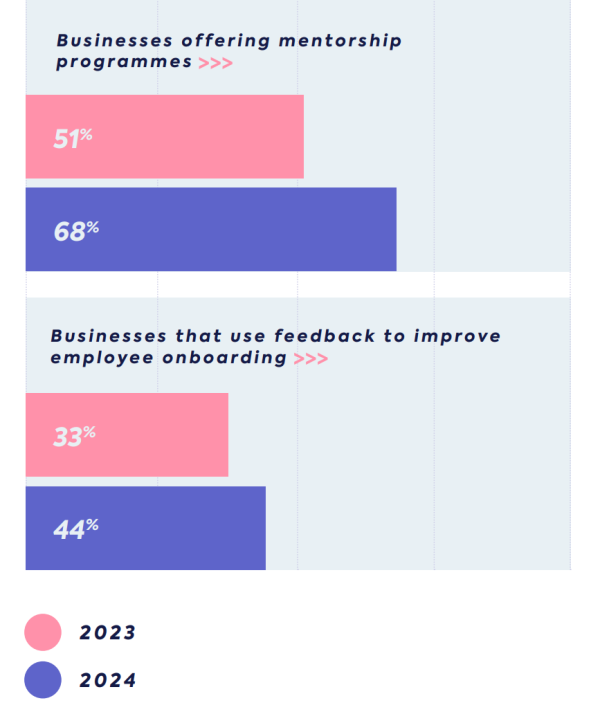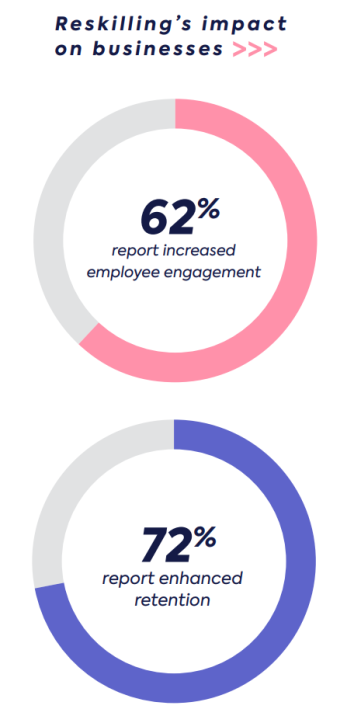Employee retention is a challenge that many businesses face. High turnover rates not only affect company performance but also increase hiring costs and disrupt team dynamics. This challenge is even greater in tech roles, where companies are competing for highly valuable and in-demand skills.
The latest insights from mthree’s Diversity in Tech report highlight key strategies for improving retention, particularly among diverse employees. From mentorship programmes to upskilling initiatives, businesses are finding new ways to keep their teams engaged and committed for the long term.
The power of mentorship and onboarding
Strong onboarding processes and mentorship programmes can make all the difference when it comes to employee retention. According to the report, 68% of companies now offer mentorship programmes, a significant increase from the previous year. These programmes help employees, particularly those from underrepresented backgrounds, navigate their careers with the support of experienced colleagues.
Mentorship provides more than just career advice. It fosters a sense of belonging and integration within a company culture, which is crucial for long-term retention. Employees who feel supported and connected to their workplace are far less likely to leave in search of better opportunities.
Another vital component is onboarding. Many companies are now using feedback from diverse hires to improve their onboarding processes, with 44% implementing changes based on this feedback. When new employees feel welcomed and valued from day one, they are more likely to stay engaged and committed to their roles.

These combined efforts have already shown results. In 2023, 59% of businesses struggled to retain diverse talent. In 2024, that number dropped to 40%, demonstrating the positive impact of these effective employee retention strategies.
Invest in employee growth with reskilling and upskilling
One of the biggest reasons employees leave a company is a lack of career development opportunities. To combat this, tech businesses are investing heavily in reskilling and upskilling programmes. These initiatives allow employees to expand their skill sets, opening up new career paths and making them feel valued by their employers.
The report reveals that 93% of tech employers now offer reskilling or upskilling programmes, recognising their role in improving both engagement and retention. The benefits are clear:

By providing employees with continuous learning opportunities, businesses create a culture of growth and innovation. Employees are more likely to stay when they see a clear path for progression and feel that their professional development is a priority.
Creating an environment where employees feel empowered to learn and grow not only benefits individuals but also strengthens the business as a whole. Employees who see long-term career opportunities within their company are more likely to stay and contribute to the organisation’s success. Encouraging employees to take ownership of their learning and development can significantly reduce employee turnover while enhancing overall employee satisfaction.
Building an inclusive retention strategy
While mentorship, onboarding, and skills development programmes have made a significant impact, 40% of businesses still face retention challenges. This suggests that existing strategies need to be expanded and tailored to better meet the needs of all employees.

One key solution is setting diversity retention targets, yet only 30% of companies currently use them. Having measurable goals for employee retention ensures that businesses remain accountable and actively work towards creating an inclusive environment. Additionally, implementing employee recognition initiatives can further encourage employees to stay engaged and committed to the company.
Unconscious bias training for managers can also play a crucial role in improving retention. Currently, only 22% of organisations provide this type of training, despite its proven ability to create fairer and more supportive workplaces. When managers understand and address biases, they can better support their teams and ensure that all employees feel valued.
Promoting a culture of open communication is key to reducing employee turnover. Employees who feel heard and understood are more likely to stay committed to their roles. Feedback sessions and transparent leadership can create an environment where employees feel safe to express their concerns and ideas. Businesses that take steps to improve employee experience through these initiatives can expect higher retention rates and improved morale.
Final thoughts on how to retain employees
Understanding how to retain employees is more important than ever, particularly in the fast-moving tech industry. The data highlights the importance of mentorship, onboarding, and continuous training and development opportunities. These strategies not only help businesses keep their top talent but also foster a more inclusive and engaged workforce.
There is still work to be done. Expanding initiatives, setting retention targets, and incorporating diversity-focused training will be key to ensuring that employees feel supported. By prioritising retention and adopting effective employee retention strategies, businesses can build stronger, more sustainable teams and stay ahead in an increasingly competitive industry.








